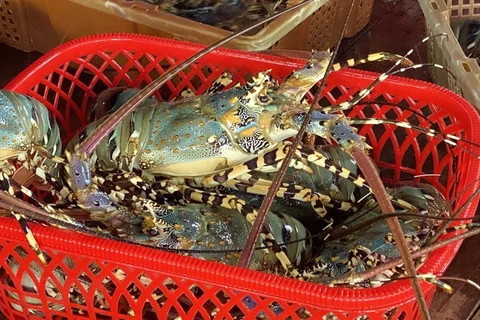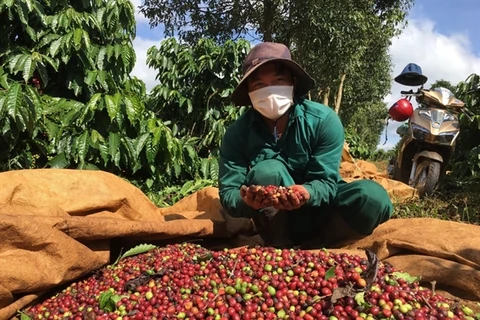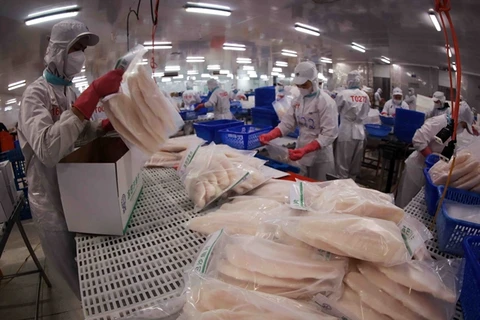Hanoi (VNS/VNA) - It is necessary to develop more detailed and consistent regulations on seafood production for export in line with the implementation of solutions towards sustainable and responsible fishing practices, according to the Vietnam Association of Seafood Exporters and Producers (VASEP).
VASEP Deputy General Secretary Nguyen Hoai Nam said that there is a lack of consistency among existing legal documents on seafood production, making it difficult for enterprises to comply.
He pointed out that, for example, Decree 37/2024/ND-CP dated April 4, 2024 guiding the implementation of several points of the Law on Fisheries and Decree 38/2024/ND-CP on administrative penalties for violations in fisheries still causes different understandings related to the mixing of imported fishery products with those domestically exploited.
It should be made clear how that mixing is banned, in a batch for export, in a container, or in any situation, he said.
The fact is that not every batch has products processed from raw materials of the same origins, but they are mixed because raw materials of domestic origin alone are not adequate to meet the demand. The key is that enterprises must be able to prove the fishing practices are legal, he said.
VASEP President Nguyen Thi Thu Sac said that fisheries businesses commit to work with the Government in the process of removing the yellow card warning against illegal, unreported and unregulated (IUU) imposed by the European Commission.
However, when issuing regulations, State management agencies should clearly define the goal that control should be on the entire fishery value chain, from exploitation and processing to exporting, she said.
Sac pointed out that most enterprises operating in the fishery industry are of small or medium size which makes it easier for them to quit the market or just produce following outsourcing contracts.
Thus, besides removing IUU yellow card, it is necessary to create favourable conditions for businesses to operate efficiently and ensure incomes for fishermen and workers to increase the added value of the fishery chain.
The Government early this week issued Resolution 52/NQ-CP on action programme and plan to combat IIU and promote sustainable development of the fisheries industry.
Accordingly, the focus will be on ensuring no illegal fishery products are exported and IUU fishing will be thoroughly handled.
The long-term solution is to urgently review and improve policies for the fisheries industry, especially policies on aquaculture, exploitation, protection and development of aquatic resources, preservation and processing for export, as well as support to modernise fishing practices and improve livelihoods of fishermen and enhance their practices in line with domestic and international regulations./.
VASEP Deputy General Secretary Nguyen Hoai Nam said that there is a lack of consistency among existing legal documents on seafood production, making it difficult for enterprises to comply.
He pointed out that, for example, Decree 37/2024/ND-CP dated April 4, 2024 guiding the implementation of several points of the Law on Fisheries and Decree 38/2024/ND-CP on administrative penalties for violations in fisheries still causes different understandings related to the mixing of imported fishery products with those domestically exploited.
It should be made clear how that mixing is banned, in a batch for export, in a container, or in any situation, he said.
The fact is that not every batch has products processed from raw materials of the same origins, but they are mixed because raw materials of domestic origin alone are not adequate to meet the demand. The key is that enterprises must be able to prove the fishing practices are legal, he said.
VASEP President Nguyen Thi Thu Sac said that fisheries businesses commit to work with the Government in the process of removing the yellow card warning against illegal, unreported and unregulated (IUU) imposed by the European Commission.
However, when issuing regulations, State management agencies should clearly define the goal that control should be on the entire fishery value chain, from exploitation and processing to exporting, she said.
Sac pointed out that most enterprises operating in the fishery industry are of small or medium size which makes it easier for them to quit the market or just produce following outsourcing contracts.
Thus, besides removing IUU yellow card, it is necessary to create favourable conditions for businesses to operate efficiently and ensure incomes for fishermen and workers to increase the added value of the fishery chain.
The Government early this week issued Resolution 52/NQ-CP on action programme and plan to combat IIU and promote sustainable development of the fisheries industry.
Accordingly, the focus will be on ensuring no illegal fishery products are exported and IUU fishing will be thoroughly handled.
The long-term solution is to urgently review and improve policies for the fisheries industry, especially policies on aquaculture, exploitation, protection and development of aquatic resources, preservation and processing for export, as well as support to modernise fishing practices and improve livelihoods of fishermen and enhance their practices in line with domestic and international regulations./.
VNA
























